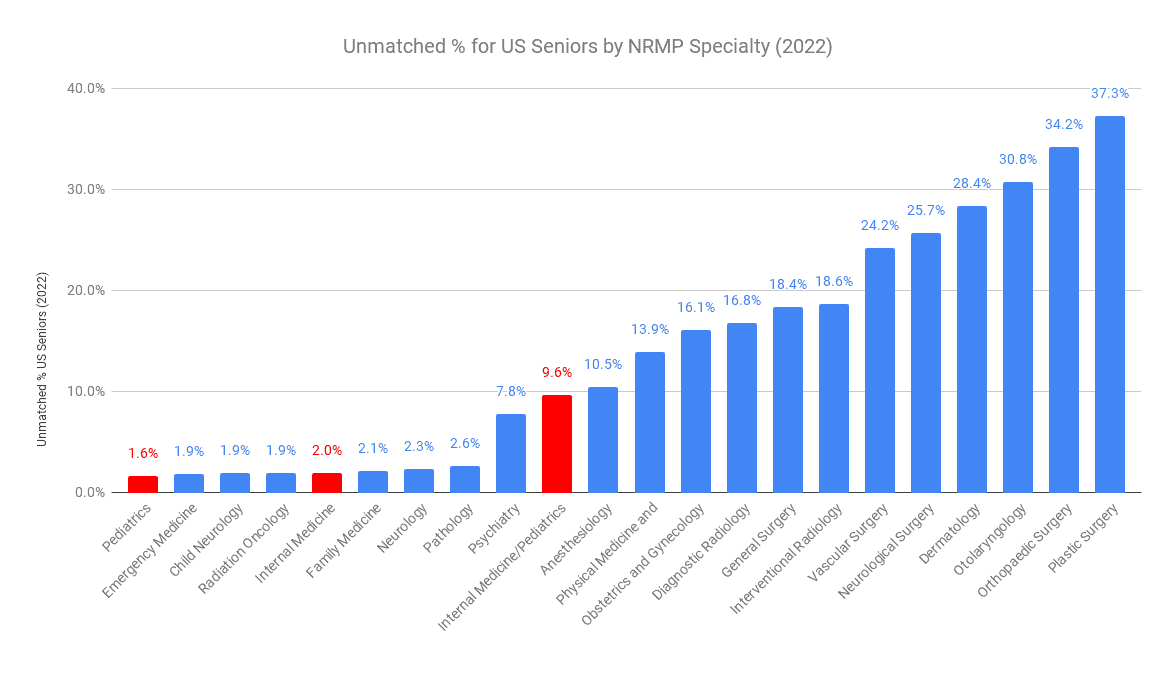
Do you want to know how to become an allergist/immunologist? Are you interested in a medical career that provides not only patient care but also offers unique opportunities for medical research in a field that is currently suffering from a shortage of doctors?
If so, an allergist/immunologist career may be the perfect choice for you. In this blog post, I will explain what an allergist/immunologist does and how to become one, even if you’re only in high school.
Summary:
- Allergists/immunologists are specialists in your body’s immune system
- Allergists/immunologists can choose between internal medicine, pediatrics, or the combined med/ped residencies followed by a 2-year fellowship
- Going to a top medical school may help a bit. However, how you do on your USMLEs (Board) scores and in your med school class ranking will matter more
- Non-PhD degrees like MBAs and MPHs appear to have no advantage to becoming an allergist/immunologist (and may be a slight disadvantage)
Table of Contents
What Are Allergists / Immunologists?
Is an Allergist/Immunologist a Doctor?
Are allergists/immunologists doctors? This question often comes up as people confuse immunology as a research or academic position. The answer to this question is yes; allergists and immunologists are doctors.
An allergist/immunologist is a specialized physician who has completed medical school, usually followed by a four-year internal medicine, pediatrics, or combined internal medicine/pediatrics residency.
An additional two years of fellowship training is required. The first year of fellowship is focused on clinical care while the second is often spent on research.
Allergist vs. Immunologist: What’s the Difference?
Allergists and Immunologists share the same general tasks and the terms are often used interchangeably. Both are doctors who can diagnose and treat patients’ symptoms related to allergies or the immune system.
Doctors calling themselves “immunologists” often have a practice specializing in conditions that impact the immune system beyond allergies, such as autoimmune diseases or HIV.
In summary, immunologists are allergists but may have specialized knowledge about certain conditions that allow them to better treat symptoms.
How Long Does It Take To Become an Allergist/Immunologist?
Becoming an allergist/immunologist is no easy feat and requires considerable time and energy. But if you’re up to the challenge, the results can be gratifying.
It takes a minimum of 13 years after high school to become an allergist. That includes four years of undergraduate education, four years of medical school, at least 3 years of residency, and two years of fellowship. Along the way, you’ll have to take various standardized exams, including the SAT, the MCAT, and the USMLE Step 1 and Step 2 CK.
Undergraduate (4 Years)
The first step to becoming an allergist/immunologist is entering and completing an undergraduate program. This means taking the SATs and doing well enough to be accepted into a college or university. Once accepted into an undergraduate program, you’ll have to complete a minimum of four years of academic coursework. This includes classes in biology, chemistry, physics, English, and other general education courses.
Medical School (4 Years)
The next step is to take the MCAT, a standardized exam that measures your knowledge and skills in biology, chemistry, physics, and psychology. You’ll need to score well on the MCAT for med school acceptance.
You’ll have to complete four years of academic and clinical training during medical school. This includes classes in anatomy, physiology, pharmacology, pathology, and other medical topics. You’ll also have to complete clinical rotations at hospitals and other healthcare facilities to gain hands-on experience.
Internal Medicine / Pediatrics Residency (3-4 Years)
After you’ve completed medical school, you’ll have to match into a 3-year internal medicine or pediatrics residency, or a 4-year combined med/ped residency. To do this, you’ll have to take the USMLE Step 1 and Step 2 CK exams. These exams measure your knowledge and skills in the areas of clinical medicine. Once you’ve passed these exams, you’ll be eligible to apply for residency.
After Residency: Licensing + Board Certification
Upon completing your residency, you’ll be eligible to apply for a medical license, a requirement for practice. You’ll also be qualified to take either the American Board of Pediatrics (ABP) or the American Board of Internal Medicine (ABIM) exams to become board-certified.
Fellowship (2 Years)
After completing your residency, you must take further training in an allergy/immunology program. Here you will gain unique expertise in immunology and allergy research and treatment. Training usually progresses from clinical training to research.
After the 2 years, you will be eligible to take the American Board of Allergy and Immunology exam and become certified.
Becoming an allergist/immunologist takes a minimum of 13 years after high school. It’s a long and arduous process, but if you’re dedicated and passionate about becoming an allergist/immunologist, the rewards are worth it.
How Competitive is it to Become an Allergist/Immunologist?
The specialties required to become an allergist/immunologist are less competitive specialties in matching into a residency program. Each year, thousands of hopeful medical school graduates apply for a limited number of positions in their preferred specialty. The Match system, run by the National Resident Match Program (NRMP), pairs applicants with training programs based on their preferences.
But how competitive are the required specialties in the US? To answer this question, it is important to look at the unmatched rates of US seniors by specialty. The unmatched rate refers to the percentage of US seniors who applied for a residency program in that specialty but did not get matched. It considers each applicant’s first-choice specialty. So, if you applied to a different specialty as a “backup” but didn’t match because you matched in your first choice, this wouldn’t be included. To learn more about how to maximize your chances at a dream residency through “The Match,” see this article.
In the 2022 Match, graduating US medical school seniors attending MD schools had a 1.6%, 2.0%, and 9.6% unmatched rate for pediatrics, internal medicine, and med/ped respectively. These are among the less competitive specialties, especially compared to specialties like plastic surgery (unmatched % 37.3%), orthopedic surgery (34.2%), or otolaryngology (sometimes called “ENT” for ear-nose-throat; 30.8%).
For more on the competitiveness of anesthesiology relative to other medical specialties, see this article.
Allergist/Immunologist Annual Compensation
Salary is an important factor when considering your future in a specialty. Allergists/immunologists have an average annual salary of $298,000. However, this can vary dramatically based on practice setting, specialty training, and experience level.
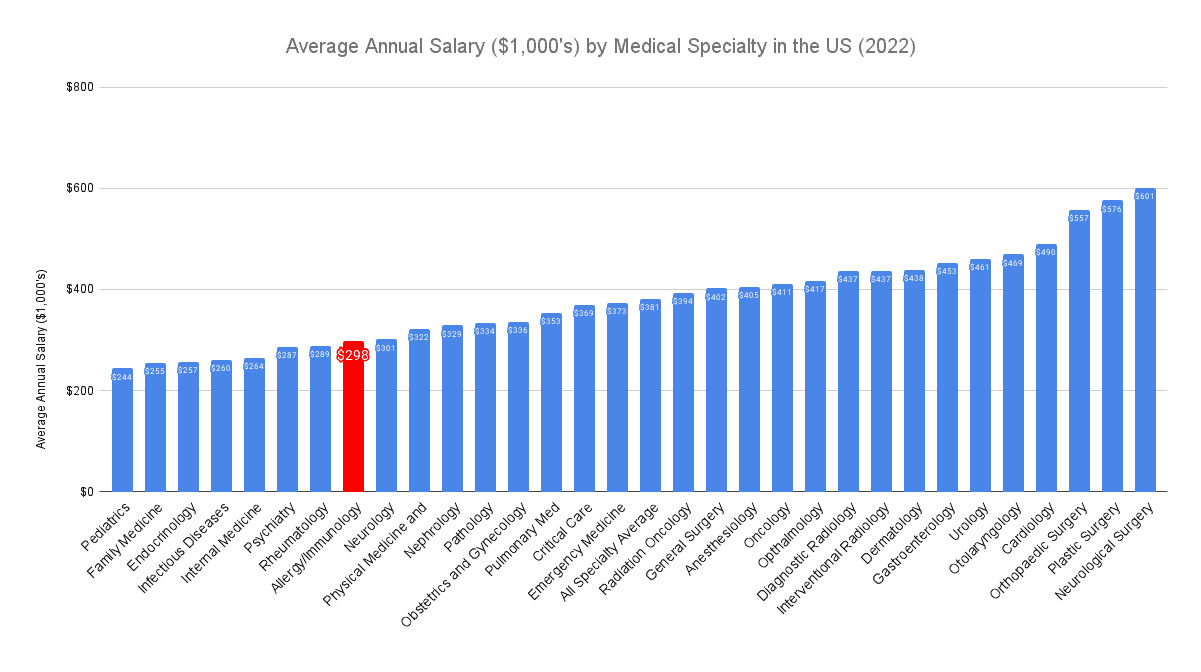
Allergists/Immunologists make $298,000 per year on average
How Much Do Allergists/Immunologists Make an Hour?
You may also be wondering, how much do allergists/immunologists make per hour? And how is the balance between time inside vs. outside the hospital for the specialty?
While there aren’t perfect data, we’ve compiled data re: hours/weeks worked and annual salary for various specialties, including allergist/immunologist.
Here are the data:
| Average Annual Salary | Average Hourly Salary | On-Call Schedule | Hours/Week | Avg Weeks Worked/Year | |
|---|---|---|---|---|---|
| Allergy/Immunology | $298,000.00 | $125.93 | 49.3 | ||
| Anesthesiology | $405,000.00 | $146.24 | Medium | 61 | 45.4 |
| Cardiology | $490,000.00 | $177.54 | 57.5 | ||
| Critical Care | $369,000.00 | $114.91 | 66.9 | ||
| Dermatology | $438,000.00 | $211.11 | Low | 45.4 | 45.7 |
| Diagnostic Radiology | $437,000.00 | $170.46 | Low | 58 | 44.2 |
| Emergency Medicine | $373,000.00 | $169.59 | Medium | 46.4 | 47.4 |
| Endocrinology | $257,000.00 | $110.40 | Medium | 48.5 | |
| Family Medicine | $255,000.00 | $101.85 | Medium | 52.6 | 47.6 |
| Gastroenterology | $453,000.00 | $168.53 | Medium | 56 | 47.7 |
| General Surgery | $402,000.00 | $141.88 | High | 59.4 | 47.7 |
| Infectious Diseases | $260,000.00 | $101.44 | High | 53.4 | |
| Internal Medicine | $264,000.00 | $100.81 | Medium | 54.9 | 47.7 |
| Interventional Radiology | $437,000.00 | ||||
| Nephrology | $329,000.00 | $122.40 | Medium | 56 | |
| Neurological Surgery (Assistant Prof. Median) | $600,500.00 | $214.96 | Medium | 58.2 | |
| Neurology | $301,000.00 | $129.09 | Medium | 50.8 | 45.9 |
| Obstetrics and Gynecology | $336,000.00 | $123.26 | Medium | 58 | 47 |
| Oncology | $411,000.00 | $143.43 | Low | 59.7 | |
| Opthalmology | $417,000.00 | $173.97 | Medium | 51 | 47 |
| Orthopaedic Surgery | $557,000.00 | $207.91 | Medium | 57 | 47 |
| Otolaryngology | $469,000.00 | $184.01 | High | 53.1 | 48 |
| Pathology | $334,000.00 | $147.74 | Low | 47.1 | |
| Pediatrics | $244,000.00 | $108.16 | Medium | 47 | 48 |
| Physical Medicine and Rehabilitation | $322,000.00 | $147.76 | 45.4 | ||
| Plastic Surgery | $576,000.00 | $230.77 | Medium | 52 | |
| Psychiatry | $287,000.00 | $131.04 | Low | 46.5 | 47.1 |
| Pulmonary Med | $353,000.00 | $119.77 | Medium | 61.4 | |
| Radiation Oncology (Assistant Prof. Median) | $393,734.00 | $158.36 | Low | 51.8 | |
| Rheumatology | $289,000.00 | $112.33 | 53.6 | ||
| Urology | $461,000.00 | $172.49 | High | 58.1 | 46 |
| Total Average | $381,233.35 | $147.44 | 53.9 |
And the estimated physician salary per hour by specialty (allergy/immunology highlighted in red):
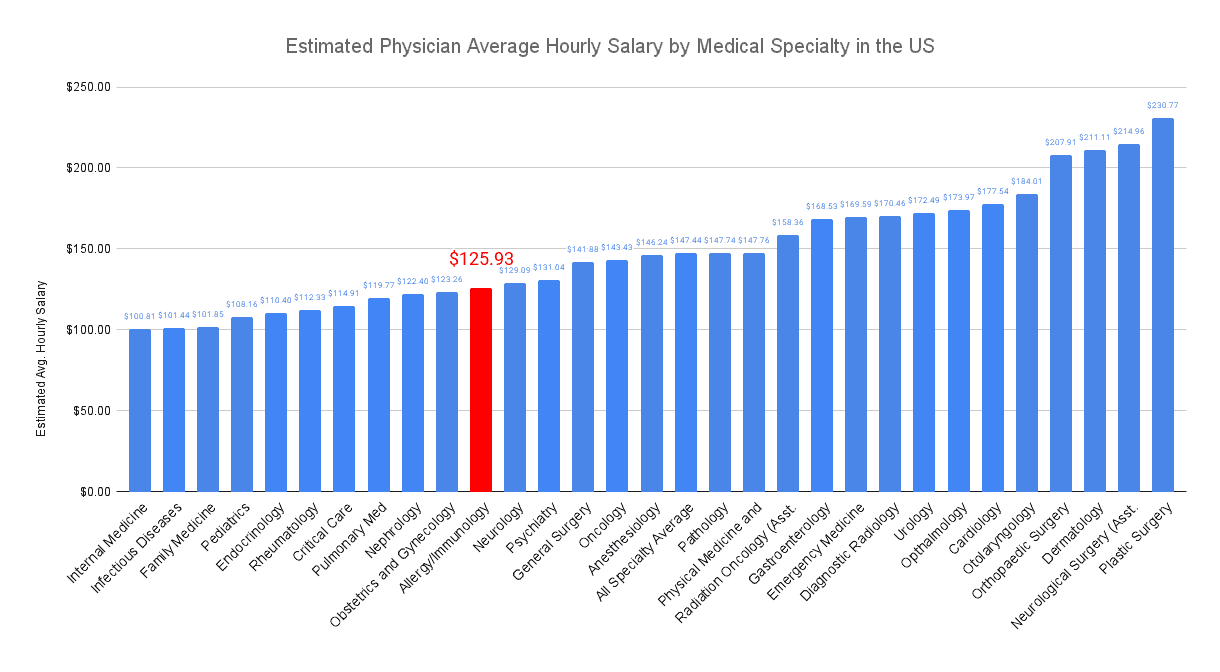
Allergists/Immunologists make $125 an hour on average
Note: when data were unavailable for weeks worked per year, 48 weeks was used as an estimate to calculate the estimated hourly salary.
Getting AOA (Med School Honors) Helps in Becoming an Allergist/Immunologist
Medical school is one of the most challenging aspects of becoming a doctor. Many medical schools have established Alpha Omega Alpha (AOA) branches to recognize top students’ hard work and dedication.
Alpha Omega Alpha (AOA) is the medical school honors society for students who excel in their studies and demonstrate an exemplary commitment to professionalism and leadership. Each medical school may elect up to 20% of their graduating class to be inducted into AOA.
Induction into AOA is a prestigious honor that carries with it a variety of benefits. AOA members may be eligible for special scholarships and fellowships and can often receive priority consideration for residency positions.
The AOA advantage is particularly notable for the most competitive fields and/or residency programs. The 2022 Match data showed that there wasn’t much advantage to match rate for US medical school seniors with AOA membership when matching into pediatrics or internal medicine. However, the AOA membership showed a 10% advantage when matching into the combined internal medicine/pediatrics specialty. In other words, AOA membership provided a moderate advantage to matching into an internal medicine/pediatrics residency.
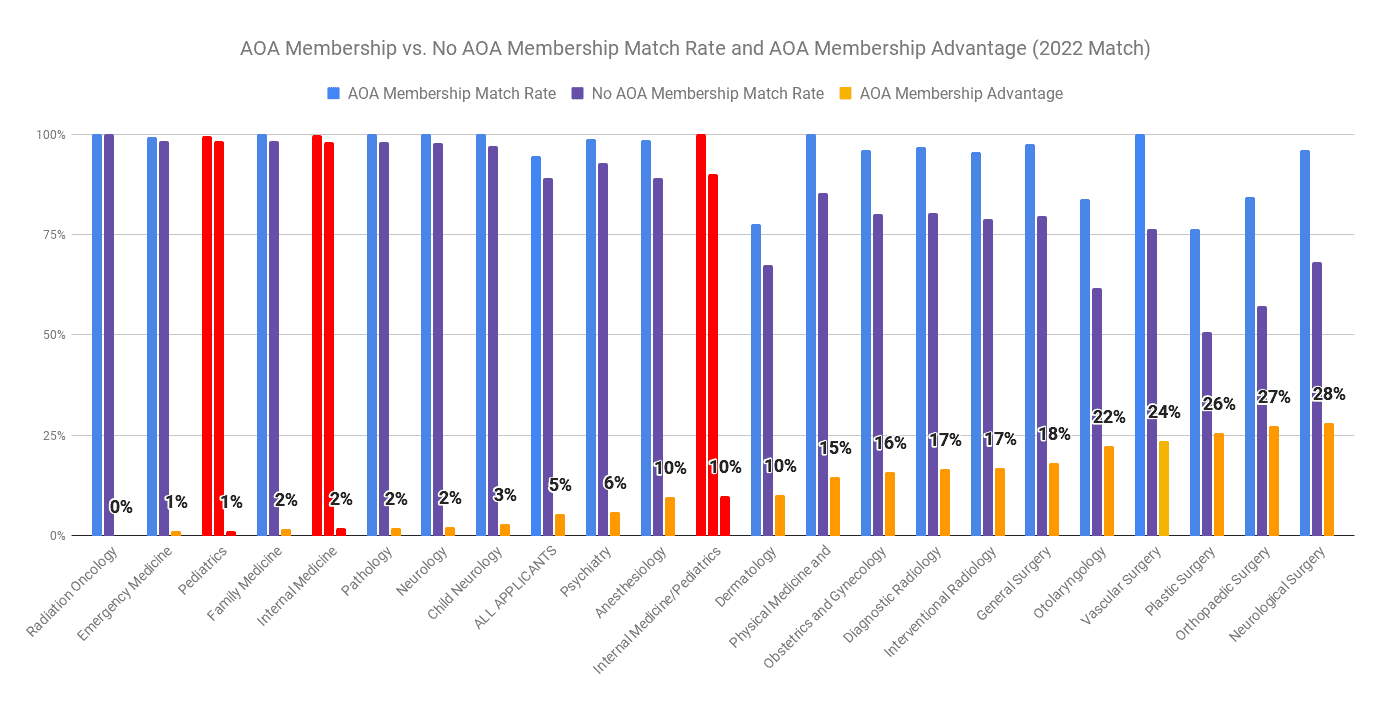
AOA membership correlated with a 10% match rate advantage for Internal Medicine/Pediatrics in the 2022 Match
See this article for more on AOA medical schools and the importance of class rank for matching.
Do You Need to Attend a Top School to Become an Allergist/Immunologist?
When pursuing a career as an allergist/immunologist, attending a top medical school can make a difference in matching into your desired specialty. According to a survey of internal medicine/pediatrics program directors, over half of those surveyed reported considering applicants’ med school reputation when considering whom to interview, giving it an importance score of 3.9 out of 5.
Moreover, graduating from a school in the top 40 for NIH funding is associated with a 4% increase in the likelihood of matching into internal medicine/pediatrics as a field. There was only a 1% advantage for the individual internal medicine and pediatrics programs. This is potentially because top medical schools have more resources and access to clinical experience, which can help prepare students prepare for the more competitive med/ped specialty.
That said, it is important to remember that the name of the school alone does not guarantee success in any field. While attending a top medical school may have advantages, it is ultimately up to the individual to make the most of the opportunities presented. And while there is an advantage to being from a more prestigious institution, one’s record at the school will matter much more, including things like USMLE scores, class rank, and letters of recommendation.
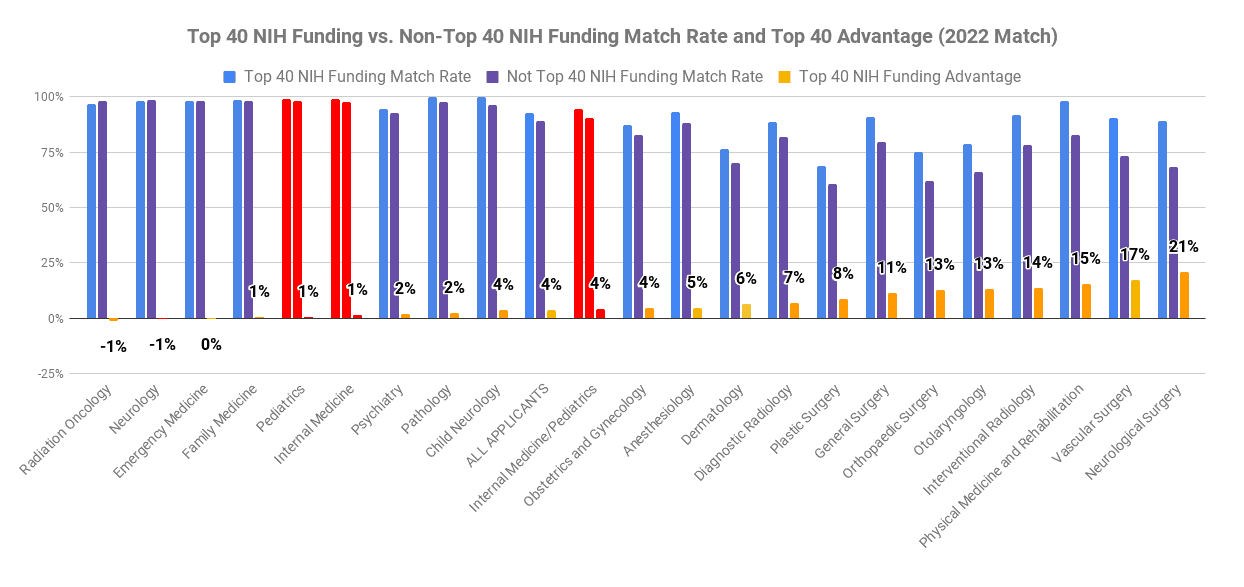
Graduating from a medical school ranked in the top 40 by NIH funding correlated with a 4% match rate advantage for Internal Medicine/Pediatrics in the 2022 Match
Does an MPH or MBA Help You Become an Allergist/Immunologist?
Medical training is long and arduous. Remarkably, many students consider completing other degrees before, after, or even while pursuing their medical studies. Degrees such as Master of Public Health (MPH) and Master of Business Administration (MBA) may seem attractive to potential residents due to their additional qualifications. But do these additional degrees give applicants an edge in the residency application process?
The truth is that having an additional degree may not matter as much as one thinks. We crunched the numbers on the match rate for graduating students from MD schools for those with non-PhD other degrees vs. those that did not have a second degree. For the residencies required to become an allergist/immunologist, the match rate advantage was -3% to 0% for those with degrees like an MPH or MBA. This implies that having a second degree that isn’t a Ph.D. doesn’t appear to help your chances of matching into these residencies and may even hurt them (slightly).
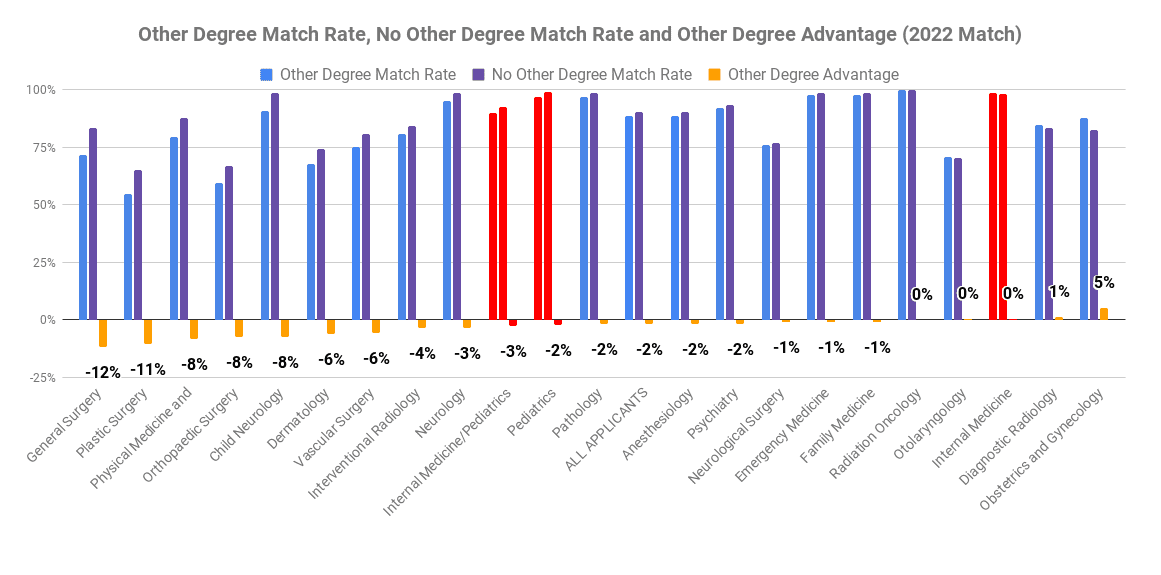
Having another degree like an MBA or MPH correlated with a 0% match rate disadvantage for Internal Medicine in the 2022 Match
It’s important to note that this study only looked at the overall match rates of medical students with another degree. The data doesn’t look at the type of degree, the school it was obtained from, and the quality of the applicant’s experience and credentials.
Having a second degree could open up some additional career opportunities. For instance, having an MPH or MBA may prove beneficial for those looking to go into healthcare administration or research.
Concluding Thoughts
Becoming an allergist/immunologist is a challenging but rewarding career path. It is perfect for those who love research, physiology, and problem-solving. With hard work, dedication, and a desire to help others, allergists/immunologists can make a real difference in the world of healthcare.
Looking for a Residency Advisor?
Looking for a residency advisor? Want help writing your personal statement? Need effective strategies for interviewing? Do you have things on your application – e.g., low USMLE scores, failed USMLEs, no research, IMG status, or others – you need help overcoming?
Be sure to check out our Residency Advisor service.

